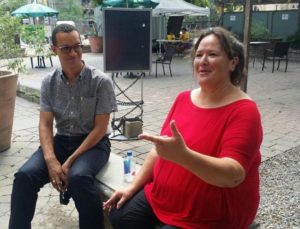If This is The End, a play by Shandra Spears Bombay

By Barb Nahwegahbow
What does a girl do when she finds out at the age of 19 that instead of being just one-eighth First Nation, she is actually half-First Nation? Playwright Shandra Spears Bombay tells us all about it and more in her autobiographical one-woman show, If This is The End.
This engaging, raw, and courageous play laced with just the right touch of humour is a work in progress that Spears Bombay workshopped for four days. She worked with Heather Majaury and Marion de Vries who directed and dramaturged the play. There was a single public performance on August 12 at Toronto’s Factory Theatre in their Mainspace.
A citizen of Rainy River First Nation/Manitou Rapids, Spears Bombay is a survivor of the infamous Sixties Scoop. Given up for adoption by her non-Indigenous mother, she was adopted when she was five and a half months old. By that time, she’d had four sets of parents including her birth parents, two sets of foster parents and then her adoptive parents.
She grew up with her non-Indigenous adoptive family in Chatham, Ontario, and attended Tecumseh High School. Spears Bombay tells us she didn’t see any racist overtones in the name of the school’s sports team, the Braves and she cheered them on along with her classmates. A little grin and a raised eyebrow tells us things are very different today, very different. Back then, she was just 1/8 First Nation, practically white, she said.
It was at the age of 19 when she met her birth mother, Linda, that she learned the life-changing news. Her father, Randy, was actually 100% Native which then made her 50% Native. Enter the transformation from party girl to seeker of Indigenous culture. Spears Bombay immersed herself in everything First Nation related, including long skirts and First Nation jewellery, ceremonies, Elders, and a job with a First Nation organization in Toronto, Ontario.
Holding nothing back, Spears Bombay owns the stage with her vulnerability, humour, and sadness as she takes us through her journey so far. She talks about her relationships with her adoptive family and her birth mother, and her search for her dad. Her transitions from light to dark and back to light again are easily maneuvered as she brings us into her life, her reality. She reads from a script, but one feels this is more of a prop rather than an actual necessity.
She was at her most vulnerable when she talked about the death of her father before she had a chance to meet him. Her eyes spark with anger and her voice fills with sadness as she tells the audience of his death in the waiting room of a downtown Toronto hospital. Two or three shifts of doctors and nurses passed by him, neglecting to attend to him.
Following her performance, Spears Bombay said, “My job was to keep Randy central to this round of my story. I have many years of veering away from that pain so that was my challenge to myself, to make sure I didn’t veer away from Randy.”
She learned from her birth mother that Randy was a writer and in fact, had a publisher. “At the last minute,” she said, “he’d rip up his work and burn it. I don’t know how many times that happened. So whenever I do anything with my writing and get it out in front of people, I’m brining two generations along with me.”
The next stop for her play is the Weesageechak Festival held in November 2016 by Native Earth Performing Arts in Toronto. Her ultimate goal is to have it ready for the Impact Theatre Festival in Kitchener in 2017. Following that, she plans to take it out on the road.
In the meantime, she’s keeping busy working on a book about her life.

